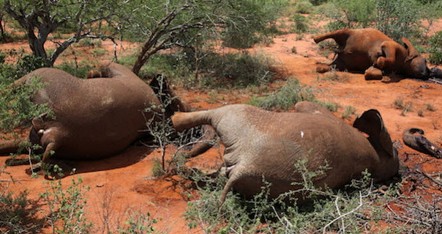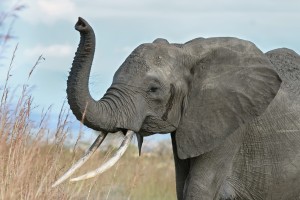The Guardian has reported that police in Tanzania have arrested a Kenyan businessman suspected of being behind an international ivory smuggling ring.
Police said that Feisal Mohamed Ali was linked to a three tonne haul of elephant tusks seized in the Kenyan city of Mombasa.
In September 2013 Hillary Clinton announced a new global effort to protect Africa’s wild elephants from poaching on the final day of the Clinton Global Initiative, the Clinton family’s annual charitable gathering in New York.
But African leaders generally remain silent on wildlife crime.
Elephant poaching has risen across Africa in recent years. In Tanzania, where Mr Ali was arrested, around 10,000 elephants were killed last year.
Save the Elephants estimates that an average of 33,000 elephants were lost to poachers every year between 2010 and 2012. In just one park in Tanzania, Selous, 67% of the elephants (pdf) were slaughtered over a four-year period.
Half of the elephants killed each year are believed to be exported to China.
Many increasingly wealthy Chinese shoppers are buying ivory trinkets as a sign of financial success. So China is the Worlds biggest market for ivory and new research funded by Save the Elephants has revealed that the price of ivory in China has almost tripled over the last four years. The surge in the price of ivory is driving a wave of killing of elephants across Africa that shows little sign of abating.
Even Prince William has attacked China over the ivory trade. He said:
‘‘those who look the other way, or spend the illicit proceeds of these crimes, must be held to account…..together they loot our planet, to feed mankind’s ignorant craving for pets, trinkets, cures and ornaments derived from the world’s vanishing and irreplaceable species.”
According to a BBC investigation:
China has around 150 legal, government-licensed ivory shops. They are the only places allowed to sell ivory to individual buyers. The government says ivory carving is an ancient art it wants to keep alive.
Chinese consumers, increasingly wealthy, desire ivory. Some think it is lucky, while for some it is a way to display their status. Others see it as a good investment and many give ivory as a gift or bribe to win favour with an official or business contact. It is certainly good business.
While Chinese officials are currently trying to crackdown on illegal trade, the investigation found clear evidence of traders of carved ivory in in China flouting the law. Pieces carved from a legal stockpile can be sold in China as long as they have a driving-licence-sized photo identification. A common scam is reusing old IDs to sell new pieces of ivory illegally smuggled into China.
China’s ivory traders are also moving online to evade the current crackdown.
The International Fund For Animal Welfare published a report on the ivory market in China in June 2006 and revealed these disturbing facts:
- Domestic trade control mechanisms in China are far from adequate to ensure any future legal trade in ivory does not negatively impact the elephant populations in Africa and Asia
-
17 of 54 (31%) registered traders visited were found to have problems in compliance with the existing trade control measures and regulations.
-
309 investigated dealers were found operating illegally, in the nine cities visited (Beijing, Shanghai, Guangzhou, Fuzhou, Nanjing, Changzhou, Yangzhou, Hangzhou and Suzhou)
- 255 of 309 investigated dealers (83%) were found in the black market.
-
In a 2-week period internet searches found 835 items of ivory on the Chinese websites. 691 ivory items were found in the search for “ivory” and “ivory carving” on the auction websites. 57 ivory items were found on onecollection site and 87 ivory items were found on one e-commerce site.
In 2014, a new report from Save the Elephants and the Aspinall Foundation found that the growing legal ivory trade in China is providing a smokescreen for illegal activity.
• The wholesale price of raw tusks has tripled in just four years since 2010
• In Beijing retail prices increased 13.5 times between 2002 and 2014. In Shanghai prices rose 8 times in the same period.
• The number of licensed factories and retail outlets in China has quadrupled in the last 10 years. In 2004 there were 9 factories and 31 authorised retail outlets. In 2013 there were 37 factories and 145 retail outlets.
• The number of elephant ivory items on sale in Beijing and Shanghai increased from 5,241 in 2002 to 8,444 in 2014.
• The most common ivory items on sale in the two cities were pendants and figurines, making up 48% of items in Beijing and 34% in Shanghai.
• Legal outlets are far outnumbered by illegal ones. In Beijing at least 78% were illegal (121 out of 156 ivory outlets). In Shanghai at least 89% were illegal (106 out of 119 outlets).
The authors say:
At the moment we are not winning the conservation battle against the elephant poachers, traffickers and consumers of ivory. Laws are in place but even in China they are not being adequately enforced. The system is presently out of control,”
Iain Douglas-Hamilton, founder of Save the Elephants says
“Without concerted international action to reduce the demand for ivory measures to reduce the killing of elephants for ivory will fail. Although half a world away, China holds the key to the future of the African Elephant.”
China does not want a total ban on ivory sales.
Petitions you can sign:



